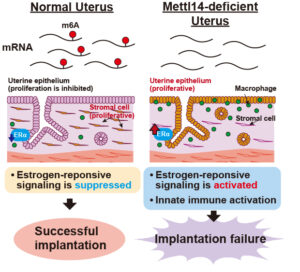Ryosuke Kobayashi1, Reika Iwakawa-Kawabata2, Jumpei Terakawa3, Makoto Sugiyama4, Sumiyo Morita1, Takuro Horii1, Izuho Hatada1 (1Laboratory of Genome Science, Institute for Molecular and Cellular Regulation, Gunma Universiity, 2Division of Integrated Oncology Research, Gunma University Initiative for Advanced Research, 3Graduate School of Veterinary Science, Azabu University, 4faculty of Veterinary Medicine, Kitasato University, 5Viral Vector Core, Gunma University Initiative for Advanced Research; *Corresponding Author)
About
Ryosuke Kobayashi PhD, Professor Izuho Hatada PhD from the Laboratory of Genome Science, Institute for Molecular and Cellular Regulation, Gunma University, and colleagues have elucidated the importance of the regulation of RNA methylation in the uterus for successful embryo implantation in mice.
Recently, N6-methyladenosine (m6A), one of the chemical modifications of RNA molecules, has gained attention as an epigenetic mechanism that regulates various life phenomena and disease pathologies. In this study, we generated genetically engineered mice with a uterus-specific deletion of Mettl14 gene, which is important for RNA m6A modification, and analyzed the importance of RNA m6A modification in pregnancy. The results showed that female mice lacking Mettl14 were infertile because embryos failed to implant in the uterus. Detailed analysis of the cause of the implantation failure suggested that estrogen-responsive signaling in the uterine tissue, which must be suppressed in normal pregnancy, is abnormally activated in the uterus of Mettl14-deficient mice, resulting in the disruption of uterine receptivity for the embryo. Furthermore, the innate immune response is also abnormally activated in the uteri of Mettl14-deficient mice, indicating an accumulation of macrophages and other cells responsible for immunity.
These findings demonstrate that the essential role of RNA methylation in the uterus for successful embryo implantation. They are also expected to drive research towards the development of diagnostic and therapeutic methods for early pregnancy miscarriages, including recurrent miscarriages.
Paper information
Kobayashi R, Iwakawa-Kawabata R, Terakawa J, Sugiyama M, Morita S, Horii T, Hatada I. Mettl14 deficiency in murine uterus aberrantly activates estrogen receptor α signaling and innate immune responses and results in implantation failure. FASEB J. 2023 Aug;37(8):e23093
Online URL
https://faseb.onlinelibrary.wiley.com/doi/10.1096/fj.202300735R








